The Struggles & Triumphs of People with Disabilities in Rojava
By Lucas Chapman & Ali Ali
Liberating a place politically is a quicker and easier process than solving all of its problems socially, which can be culturally rooted and require a transformation in mindsets.
Since the first cities of Rojava began to free themselves from the Syrian regime in 2011, there have been several simultaneous movements pushing for the rights of oppressed groups in Rojava. Ethnic minorities such as Kurds, Syriacs, and Armenians have all asserted their rights to an equal and peaceful life, and various women’s organizations have struggled for women’s rights. However, a group correctly termed the “world’s largest minority” – people with disabilities – often still find themselves deprived of equal opportunities.
Though around 15% of people worldwide have a disability, an OCHA report from 2019 found that 30% – double the global average—of Syrians live with a disability. Other reports by NGOs and monitors from 2023 have found that northeast Syria has an even higher average than the entire country, at between 40% and 48% of the population. Given the more than 10,000 wounded veterans and countless other civilians wounded in Rojava, this number should come as no surprise.
However, despite the disproportionally large number of people with disabilities and a politically progressive environment with Administration protections, many of those with disabilities still must struggle to overcome a litany of legal, social, and environmental obstacles in order to live a normal life.
Environmental and Legal Factors
Prior to the Rojava Revolution, Syria passed its Persons with Disabilities Law No. 34 in 2004. The law safeguards the right to welfare, vocational training, and discounted public services for those with disabilities. However, the law was often not implemented in many cases, and those with disabilities continued to struggle to find accessible services and work.
Article 53 of the 2023 version of Rojava’s Social Contract, which effectively acts as its constitution, states that the autonomous administration will “secure and provide the necessary capabilities for mental and physical participation in all areas of life for people with special needs and secure a decent life for those who cannot provide for their needs.”
Though the laws of Syria and Rojava protect the rights of the disabled, many legal protections have yet to be implemented. Infrastructure in Rojava is largely inaccessible for those with motor disabilities; very rarely can flat, uninterrupted sidewalks, elevators, or wheelchair ramps be found, even in administration buildings.
“Recently, a law was passed to establish well-equipped and accessible buildings, but in the context of the current buildings, 80% are not accessible,” Shoresh Ahmed (pseudonym), an inclusion manager from an unnamed NGO working in Rojava, told KCS.
And while the Autonomous Administration would like to guarantee accessibility, a lack of resources because of the constant Turkish military bombardments makes infrastructure improvements difficult. You also have the issue that much of the discrimination towards those with disabilities is rooted culturally in society, which is difficult to transform quickly through education—regardless of how much the Administration would like to.
Khazna Ali, a 40-year-old teacher and school employee from the village of Himo west of Qamishlo, has only been able to find gainful employment well into her adult years. Ali was paralyzed in her legs from the age of two and uses a custom-made wheelchair to get around. Even after receiving perfect marks in her Kurdish language courses, only with the help of her older sister was she finally able to find a teaching position in the village school.
“When I was at the teacher training center studying to become a Kurdish language teacher, the center was three floors with no ramps or elevators. Every day, four teachers had to carry me and my chair up and down the flights of stairs,” Ali said.
“I want to do a lot of things I still can’t do. The city just built a beautiful park in Qamishlo, but I can’t go because there are stairs.”
Nariman Evdike, a 36-year-old writer, told KCS about her struggles to complete her education during university.
“There were no elevators at the university. When I would go to class, everyone would be rushing to get there on time, and no one even thought to offer to help. I would have to show up before the students even arrived in order to get there early enough.”
Though these factors can be a frustrating inconvenience in everyday life, in case of invasion or war, they can become life-threatening. A 2022 Human Rights Watch report found that children with disabilities may be left behind or unable to escape armed conflict or airstrikes.
“Things got really difficult for me after my city, Sere Kaniye, fell [to the Turkish military]. I had to go from city to city, and many of the places we were forced to rent were not accessible at all; they had stairs or were on high floors. It wasn’t just me that faced these problems. I know many people with disabilities who couldn’t find homes and had to go to the camps. The situation was very bad at the camps; oftentimes the ground was not prepared, and there were no bathrooms or washing facilities. A lot of them were left behind in the city because there was no one to get them out,” Evdike said.
Camps for the displaced offer even fewer opportunities for those with disabilities. Those with disabilities of movement who lack any mobility aids may not be able to even leave their tents, and lack of even basic medicines may make life impossible for those who need medication for their disability.
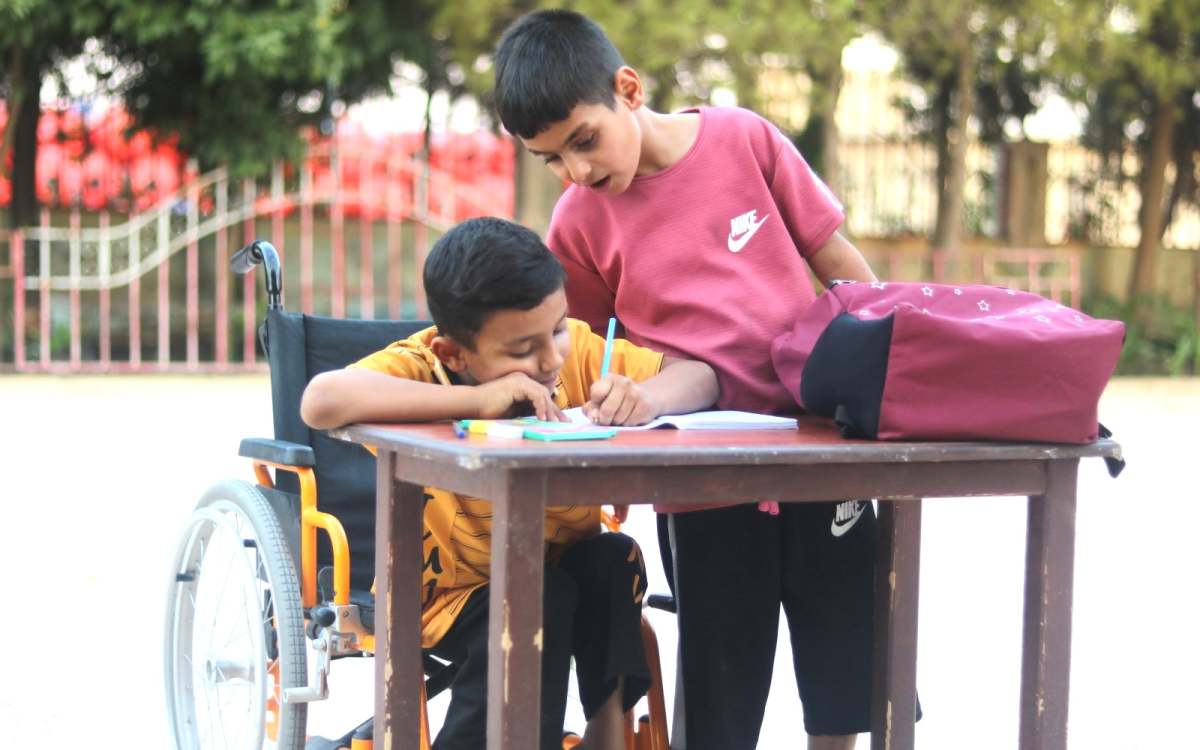
Social Considerations
The implementation of legal protections alone, however, would likely not transform Rojava into a utopia for those with disabilities. Though these perspectives may be changing, deep-rooted misconceptions about those with disabilities still abound, resulting in discrimination and ostracization.
Even medical professionals sometimes treat disabled children cruelly, and there are no pediatricians in Rojava who specialize in children with disabilities.
“My brother was sick for the first several months of his life. He wouldn’t nurse or eat. There wasn’t a doctor left in the city that we didn’t take him to. Once, a doctor told my father, ‘Take him to Damascus and have them give him an injection, it would be better if he died,’” Rojava-based journalist Shinda Akrem said of her brother, Ahmed, who has down syndrome.
Bullying and ostracization from other children is common for children with disabilities.
“The neighborhood kids would always make fun of him. Whenever he would go outside, they would tease him and tell him to dance for them,” Akrem said. Though Ahmed’s mother went door-to-door talking with neighborhood families until the teasing of her son stopped, they are often still concerned for his safety.
“He has gone missing three times. If he manages to leave our neighborhood, he gets confused and can’t get home because he can’t speak. Once we wrote his name and information on a bracelet and someone took it from him. If he is wearing a watch, someone will take it from him. We are always watching him as we are afraid he will go missing. He is very vulnerable, and we are afraid that if he gets lost, someone may take him or hurt him.”
Ahmed’s family tried their best to give him the most normal life possible, bringing him notebooks and pens, teaching him how to bathe and brush his teeth, and encouraging him to play with neighborhood children. Not all disabled children, Shinda says, are so lucky.
“I know of other children like my brother who are always wandering in the street, wearing dirty clothes, begging for money, urinating on themselves, and eating food from the ground. Their families don’t take care of them.”
It is sadly not an uncommon sight to see disabled children, particularly those with mental or learning disabilities, tied up inside their homes by family members.
“My childhood was very difficult. I was still a child, and I didn’t understand why my friends wouldn’t play with me anymore. My brothers and sisters played with me, but no one else did,” Khazna Ali said.
“Sometimes the people say things that are very hurtful. Once when I went to the souk with my friend, she went into a fabric shop, and I had to stay outside because there were stairs. Immediately the store owner came outside and angrily told me that I couldn’t stop in front of the shop. It was like I was ruining his shop’s image just by sitting out there.
Even if people mean well, when they say things like ‘oh, you poor thing,’ it’s very hurtful. Even my family will say hurtful things sometimes. There would be a wedding, or a party and I would be getting ready to go with them, and they’d say, ‘why should you come? You should just stay home.’”
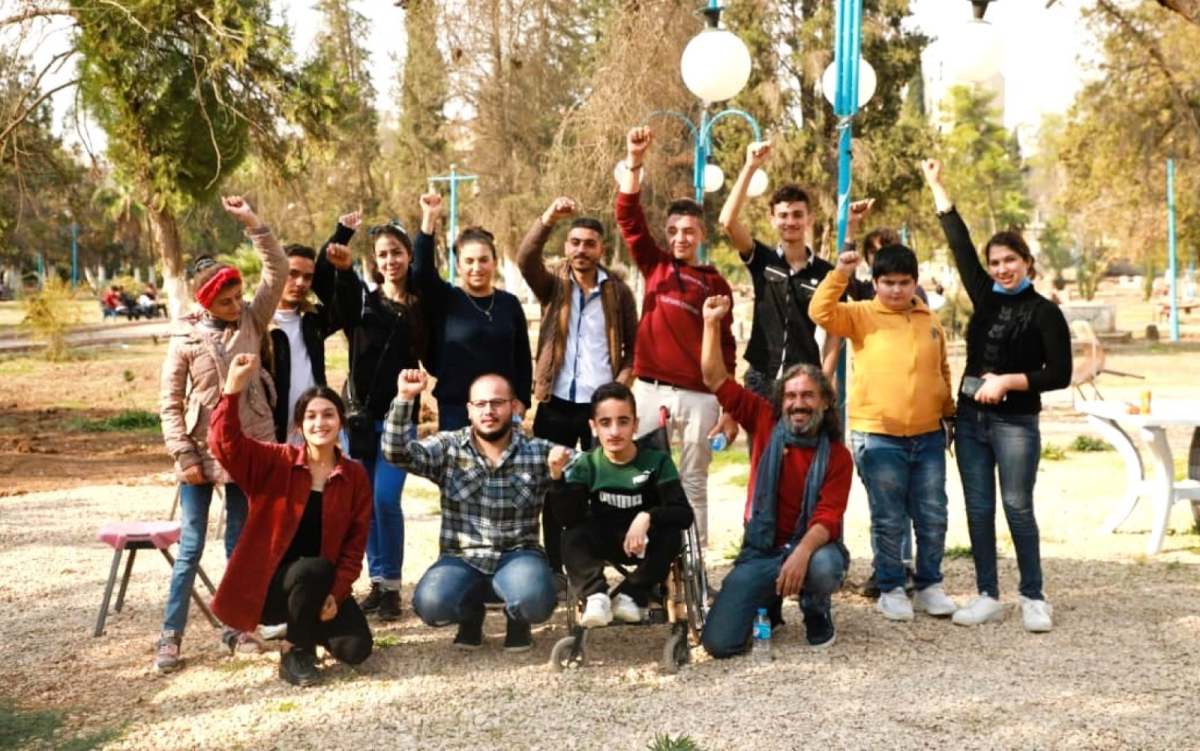
Accessibility and Opportunity
Limited resources do exist for those with disabilities in Rojava. The most widely known organizations for those with disabilities are those such as the Kurdish Red Crescent and the Hope Makers organization, which provide prosthetics and physical therapy for those with missing limbs.
“There are some local and international non-governmental organizations that work to support people with disabilities by providing social, health, and educational services. There are some rehabilitation and physical therapy centers that provide services for people with disabilities, but these centers are few and limited in their capabilities. There are some limited government initiatives aimed at improving infrastructure and providing services to people with disabilities, but they are often affected by limited government resources,” Ali Mahmoud (pseudonym), an employee working for an unnamed NGO in Rojava, told KCS.
There have been success stories in Rojava, such as centers for children with developmental and intellectual disabilities opened by the Women’s Board of the Jazira Region. Last year, Kobani University and local NGO Nudem opened a 40-day training course for children with special needs, focusing on language acquisition, play, and musical activities.
However, on top of lack of resources and funds for these facilities, external threats also contribute to lack of support for those with disabilities, in particular children. Often Turkish bombing campaigns leaves parents afraid to send their children to school, depriving children with special needs of critical education.
Shinda Akrem hopes to see more opportunities for people like her brother in Rojava.
“If he grew up in Europe, he might have been able to learn how to do some simple jobs. Maybe he might have even learned to talk. There are way more opportunities for people with disabilities abroad. But here, until today, there’s no opportunities for people like him,” Akrem said. “There was a center for kids with down syndrome that opened in Qamishlo. We brought him there, but they said that he was too old for the center.”
“It is important to understand the daily challenges that people with disabilities face, such as access to buildings, services, education, and work, and work to remove these obstacles. Integrating people with disabilities in society enriches diversity and enhances the values of coexistence and equality. A comprehensive environment must be provided that allows them to participate in all aspects of life,” Ali Mahmoud said.
Not all is lost for those with disabilities, however. Many people with disabilities in Rojava have made strides in their respective fields. Khazna Ali worked at her village’s school for four years. Nariman Evdike, on top of being an author of two books and a co-author of two more, is also the spokesperson for Rojava’s literary association.
Mohsin Ghawe, a 17-year-old aspiring photographer from Qamishlo who has brittle bone disease, recently started a project titled ‘Documenting the Everyday Lives of People with Disabilities.’ The project began some weeks after an UN-funded training session which brought together two dozen people with disabilities to learn aspects of photography from local director Azad Evdike.
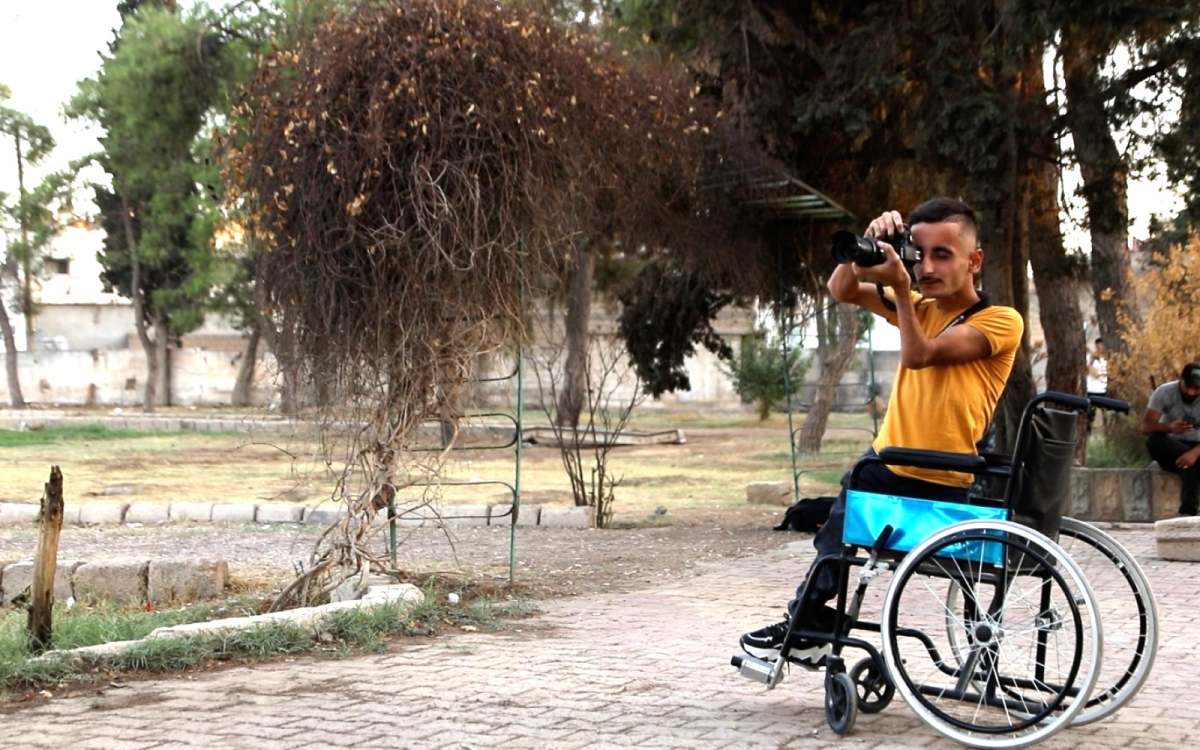
“I wanted to start this project so I could change people’s opinions here. There are people here who see people with disabilities and think they are useless or can’t do anything. They think they always have to have someone like a friend or family member watching them or helping them. But they have abilities and talents. They can work, they can make friends, they can get married, and they can have children just like anyone else.”
Ghawe hopes to expand his work even further in the future, branching out into video and documentary making as well as theater.
“To those who see people with disabilities as lesser beings, I would ask them to try and befriend someone with a disability and they will see for themselves that they aren’t lesser than anyone else.”
Even more critical than simply providing assistance to people with disabilities is providing them with the tools to become self-sufficient, according to many NGO workers.
“People are always ready to help persons with disabilities, but not ready to help build and empower the person to be independent,” Maya Patsalides, strategic communications consultant with UNDP Syria, said in a 2016 report from KALU Institute.
Mohsin Ghawe hopes for more projects and laws geared toward education and empowerment, particularly in artistic fields.
“I would like it if there were laws that allowed more people with disabilities to find work. I know there are some countries in Europe, for example, where they can get financial assistance. But I don’t think it’s a good idea to just give someone with a disability money and have them sit at home and not work. This will affect them mentally. Like I said, each person has their own talents and abilities, and they all want the opportunity to work.”



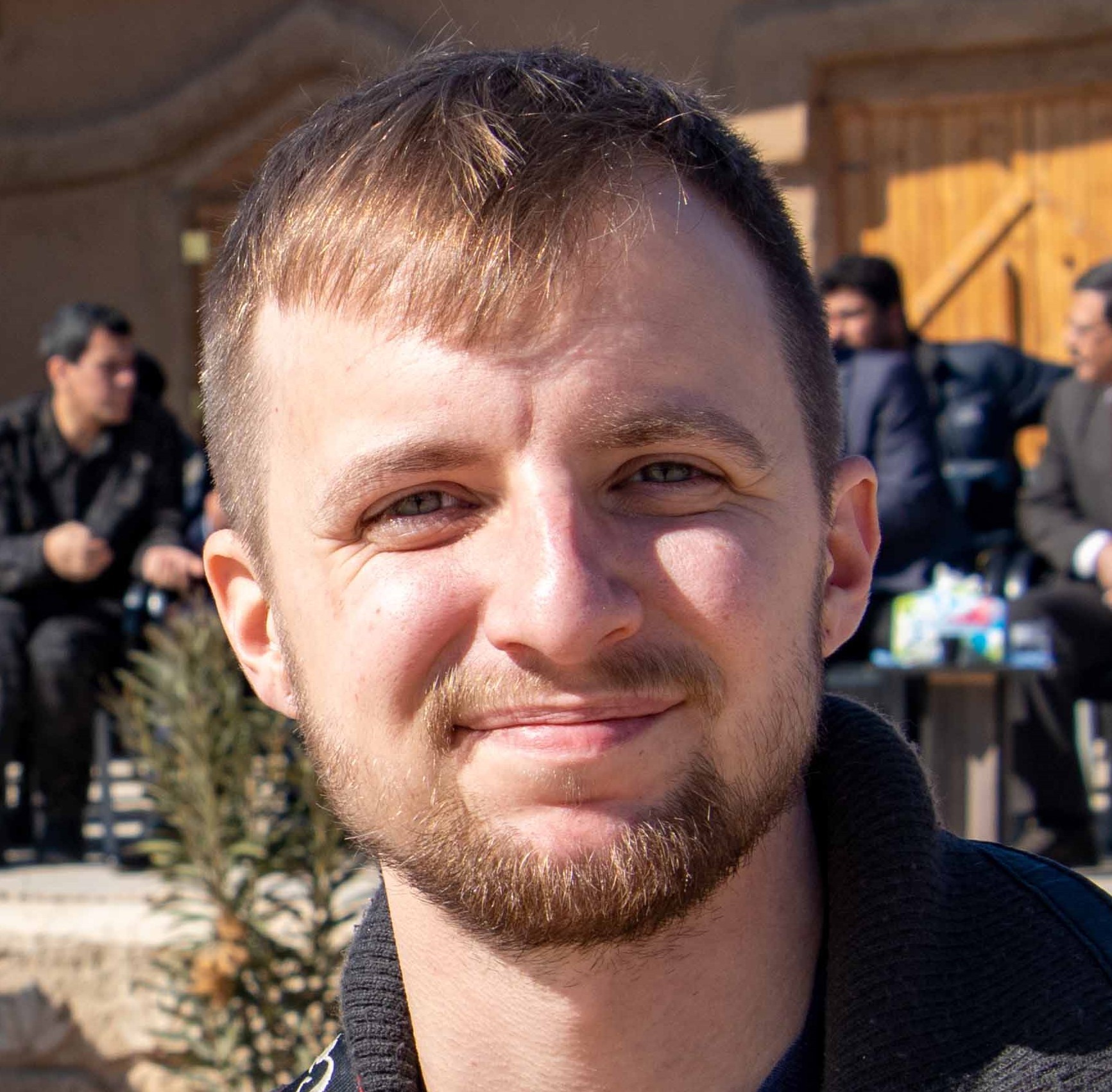
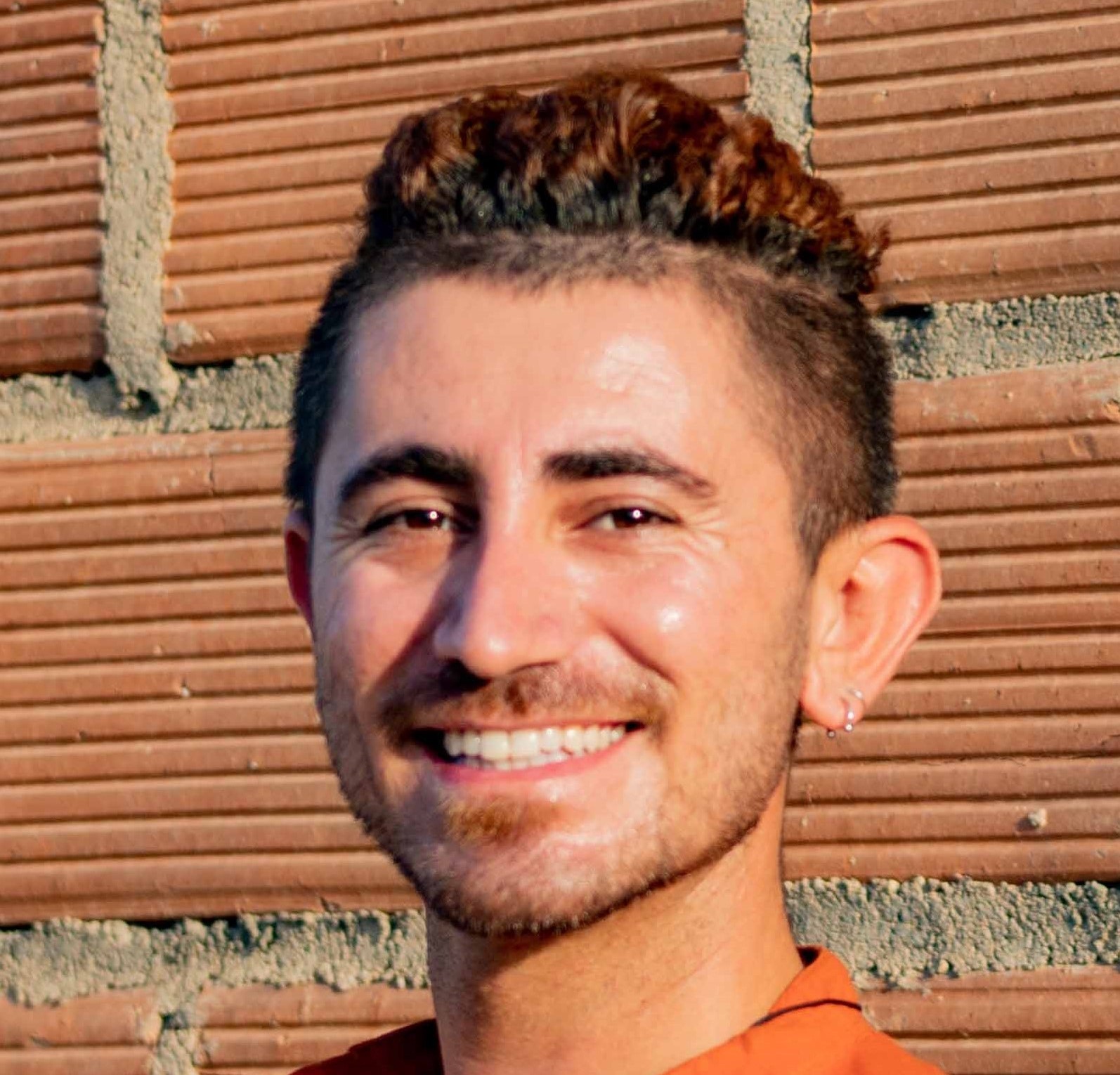
Comments are closed.